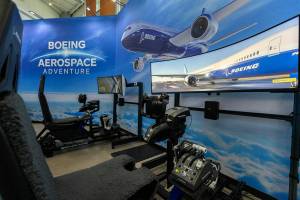Stonecipher’s style helps Boeing
Published 9:00 pm Monday, July 12, 2004
CHICAGO – Boeing Co.’s boss is pushy, aggressive and loath to compromise.
That’s the way Harry Stonecipher sees himself – with no punches pulled.
The plainspoken son of a Tennessee coal miner seems to be what the aerospace giant needed at a time when its defense business was drifting into trouble and uncertainty. Formerly the company’s chief operating officer, Stonecipher marched out of a golf-filled, 11/2-year retirement in Florida and into the chief executive’s suite in December.
So far, this old-school manager appears to have restored order. The year after Boeing was buffeted by contract scandals, the company’s stock price is up 30 percent, the business outlook has improved and so has morale at its signature commercial aircraft unit despite the protracted aviation slowdown since 2001.
Much of that resurgence is due to brightened industry prospects, heavy U.S. military spending and the new 7E7 airplane project that was conceived on the watch of his predecessor, Phil Condit. But a significant amount of the credit also goes to the craggy-faced, gravel-voiced Stonecipher, who at 68 appears to be reveling in a return to long workdays and in imposing his style of decisiveness and financial discipline.
“I tell people ‘There are no action items that are on my desk when I leave at night – none,’” Boeing’s president and CEO said in a recent interview.
Besides trying to restore the company’s sullied reputation, Stonecipher’s top priority has been to save a multibillion-dollar tanker deal with the Air Force. That deal remains in limbo amid a series of investigations. Acknowledging that some employees did “really dumb things,” he has been assuring Capitol Hill and the Pentagon that the company is not “a bunch of crooks.”
And he’s not hunkering down when it comes to Airbus, which surpassed Boeing to become the world’s No. 1 airplane maker last year – Stonecipher has been on the attack against the rival recently for what he calls unfair European government support.
Boeing has a long way to go to overcome its ethical missteps. But there seems to be a consensus that, as aerospace analyst Nicolas Owens of Morningstar Inc. put it, Stonecipher has done “a pretty good job” so far.
With Boeing reeling from the ethics charges, he “took the offensive a little bit and started trying to address that issue in Washington rather than trying to wait for the next phone call from the Department of Justice,” the analyst said.
In addition to working the phones and walking the corridors on frequent trips to Washington, Stonecipher has overhauled ethics policies and required every employee to sign a new code of conduct or lose their job.
Initially a college dropout, Stonecipher joined General Motors as a lab technician and spent four years with the company before going back to school to get a physics degree. Following a quarter-century at General Electric’s aircraft engine division, he served as chief executive of Rockford, Ill.-based aeronautic supplier Sundstrand Corp. and then McDonnell Douglas Corp., which he merged with the Condit-led Boeing in 1997.
An unrelenting focus on costs alienated Boeing’s unions during his stint as president and chief operating officer from 1997-2001. As a result, his appointment as CEO was greeted by employees with trepidation.
But, aware of his anti-union image, Stonecipher has taken more pains as CEO to keep the workforce behind him.
“Harry Stonecipher as CEO is a different person from Harry Stonecipher as chief operating officer,” said Charles Bofferding, executive director of the Society of Professional Engineering Employees in Aerospace, who lauded him for establishing a new incentive plan for Wichita employees in a contract ratified this month.
Seemingly encouraging the notion of a “softer” Stonecipher, the CEO disputes the stern, “no-nonsense” label often applied to him, saying he tries to bring a light touch to everything he does. Witness the life-size cardboard cutout of him that greets visitors to his 36th-floor corner office.
His protest is mild, however. After all, there are benefits to having a tough-guy reputation.
“I do get pretty intense sometimes,” he acknowledged. “I won’t spend any time trying to change that (image) at all. Because, quite frankly, the people who hire me and pay me, that’s what they want – they want no-nonsense.”




